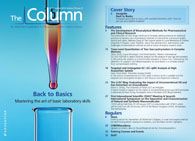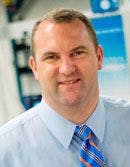First International Scientific COAST Meeting & Seventh International Symposium on the Separation and Characterization of Natural and Synthetic Macromolecules
I SCM will be held from 27–28 January 2015 in conjunction with SCM-7, which will be held from 28–30 January 2015 at the Rhone Congress Centre, Amsterdam, The Netherlands.
The First International Scientific COAST Meeting (I SCM) will be held from 27–28 January 2015 in conjunction with the Seventh International Symposium on the Separation and Characterization of Natural and Synthetic Macromolecules (SCM-7), which will be held from 28–30 January 2015 at the Rhone Congress Centre, Amsterdam, The Netherlands.
The First International Scientific COAST Meeting (I SCM) is organized by the COAST organization that coordinates many public-private collaborations in analytical chemistry research, education, and infrastructure. A number of excellent speakers have been invited to present the results of exciting collaboration projects. Researchers involved in academic-industrial collaborations involving analytical chemistry for any kind of application are invited to submit abstracts for oral or poster presentations at the meeting. While the main focus of the meeting is on analytical science, various models for collaboration, obstacles that have arisen, and best practices will also be discussed in an exhibition hall meeting that all delegates are invited to participate in. Research policy makers are encouraged to attend!

Photo Credit: Nikada/Getty Images
Analytical chemistry is a science that excels in the relevance of its results. Novel analytical technologies, methods, instruments, and consumables are often implemented rapidly and successfully in industrial laboratories. The importance of research in analytical chemistry for industry is underlined by the creation of an industrial advisory board for the I SCM and the Seventh International Symposium on the Separation and Characterization of Natural and Synthetic Macromolecules (SCM-7) conferences, and features experts from AkzoNobel, BASF, DSM, Dow Chemical, Dupont, Sabic, Shell, and Unilever.
SCM-7 is organized in conjunction with I SCM; however, unlike I SCM, the scope of the SCM meeting is limited to large molecules (including nanoparticles and solid polymers). Presentations during SCM-7 will focus on all kinds of separation techniques and all other methods for characterizing large molecules. Size-exclusion chromatography (SEC) is arguably the most important technique for the separation of polymers, but other isocratic and gradient-elution liquid chromatography (LC) techniques will also receive ample attention, as will field-flow fractionation (FFF) and capillary electrophoresis (CE) methods.
Since the first SCM meeting in 2003, mass spectrometry (MS) methods have become much more powerful and correspondingly more popular. Ion-mobility spectrometry (IMS) will be a hot topic at SCM-7. All types of spectroscopic techniques for characterizing macromolecular solutions, bulk materials, and surfaces are within the scope of SCM-7. Significant attention will be paid to nuclear magnetic resonance (NMR) and optical-spectroscopy (for example, FTIR and Raman) methods. Light-scattering (for example, multi-angle light scattering [MALS]) and viscometric techniques are of great interest for the SCM-7 audience.
SCM-7 and I SCM will overlap on one day, and collaborative projects concerning the analytical chemistry of macromolecules will be discussed as one of the parallel tracks. SCM-7 and I SCM also share the vibrant exhibition hall, where manufacturers of analytical instruments and consumables will find ample opportunity to interact with all participants. Poster sessions, discussions, coffee breaks, and lunches will all take place in the exhibition hall. Some manufacturers will present exciting new developments in vendor seminars.
Anyone who has attended one of the previous SCM meetings in Amsterdam or Dresden will likely vouch for their great scientific and social atmosphere. The SCM series has been created for scientists, students, and manufacturers to interact and enhance their exposure, and to raise the standard of scientific research in the field. The SCM series has also proven an excellent place to meet old friends and make new ones.
Important Dates: Abstracts for poster presentations must be submitted by 4 January 2015 at www.scm-7.nl
Pre-registration at a reduced fee is possible until 12 January 2015.
E-mail: info@scm-7.nl
Website: www.scm-7.nl
This article is from The Column. The full issue can be found here:http://images2.advanstar.com/PixelMags/lctc/digitaledition/November20-2014-uk.html


.png&w=3840&q=75)

.png&w=3840&q=75)



.png&w=3840&q=75)



.png&w=3840&q=75)













